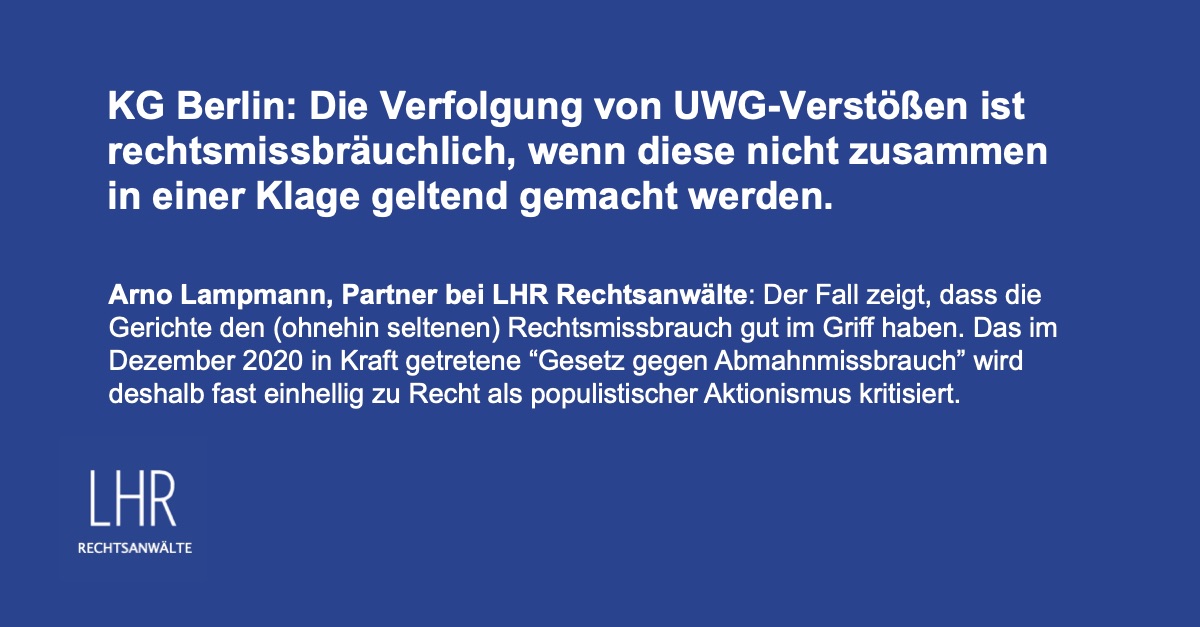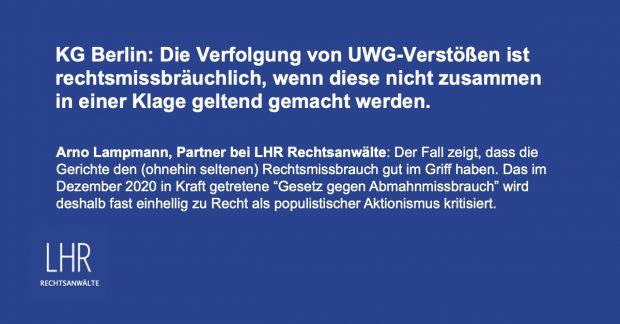
The Berlin Court of Appeal has certified a creditor of several alleged infringements of competition law in two lawsuits as having extraneous motives and thus an abuse of rights (KG Berlin, Urteil v. 22.12.2020, Az. 5 U 69/19 und KG Berlin, Urteil v. 22.12.2020, Az. 5 U 71/19, nicht rechtskräftig, Nichtzulassungsbeschwerde anhängig).
Following two separate interim injunction proceedings, the plaintiff had also filed two separate lawsuits against the defendant, as he was annoyed by allegedly incorrect basic price information for toothpaste and some drinks. In addition, the commercial register number and the link to the online dispute resolution platform (OS-Plattform) were allegedly missing. The KG Berlin is of the opinion that the plaintiff should have combined the proceedings, as this would have resulted in significantly lower costs.
Asserting claims for injunctive relief is not easy
The assertion of claims for injunctive relief, as described in the Trademark law, Competition law, Copyright und Personal rights are mainly the subject of disputes is difficult.
Contrary to popular opinion, “mass warnings”, in which the client is exempted from cost risks by a well-meaning lawyer, are not a “license to print money”. At least not if the person being warned knows how to defend himself properly.
Even if the accusation of abuse of rights is often raised in court proceedings, especially when there are no arguments on the merits, courts have now developed fine antennae for determining when the focus of a warning letter or preliminary injunction proceedings is still on the prosecution as such, or rather the endeavor to provide the lawyer and/or warning letter recipient with a source of income.
The creditor applied for two injunction proceedings
An Ebay trader of all sorts of odds and ends (and thus, conveniently for the lawyer representing him, a potential competitor of many other online traders), who at the time drew attention to himself with a veritable wave of warning letters against various competitors, had to contend with these procedural difficulties in one case.
He had been disturbed by the fact that a competitor (who otherwise specialized in food and beverages) had offered a 75 ml toothpaste tube on eBay at a unit price of €9.99 and had forgotten to include the base price. Via his lawyer, the competitor initially demanded a cease-and-desist declaration and reimbursement of costs based on a value in dispute of €10,000, i.e. €745.40 net.
The Court of Appeal found that the applicant had abused his rights
A lot of things went wrong in the period that followed. We reported on this here:
The applicant then finally withdrew his application for an injunction – not without singing numerous dirty songs (filing motions of bias).
The creditor filed two lawsuits
Instead of letting it go, the creditor not only sought his luck in the main proceedings, but also initiated not just one, but two proceedings again – despite the unmistakable advice of the Court of Appeal, which had persuaded him to withdraw his application.
The Court of Appeal once again found that the plaintiff had abused his rights
The Senate of the Court of Appeal also disapproved of this conduct – and this is not surprising in view of the previous history – and attested the plaintiff extraneous motives, as he could of course have combined the main actions(KG Berlin, Urteil v. 22.12.2020, Az. 5 U 69/19 und KG Berlin, Urteil v. 22.12.2020, Az. 5 U 71/19, nicht rechtskräftig, Nichtzulassungsbeschwerde anhängig).
Lawyer Arno Lampmann from the law firm LHR:
The case shows that the courts have a good grip on the (already rare) abuse of rights. Professional retailers – with expert advice – have always been able to defend themselves effectively against this. The “Act against Abuse of Warning Notices”, which came into force in December 2020, is therefore almost unanimously and rightly criticized as populist actionism.
(Disclosure: Our law firm represented the defendant).
